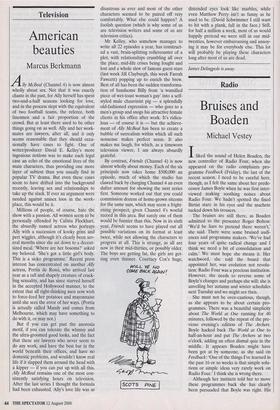Television
American beauties
Marcus Berkmann
Ally McBeal (Channel 4) is now almost wholly about sex. Not that it was exactly chaste in the past, for Ally herself has spent two-and-a-half seasons looking for love, and in the process slept with the equivalent of two football teams, the referee, both linesmen and a fair proportion of the crowd. But at least there used to be other things going on as well. Ally and her work- mates are lawyers, after all, and it only seems reasonable that they should occa- sionally have cases to fight. One of writer/producer David E. Kelley's more ingenious notions was to make each legal case an echo of the emotional lives of the main characters, thus providing one more layer of subtext than you usually find in popular TV drama. But even these cases seem to have drifted into the background recently, leaving sex and relationships to take up the slack. If ever an argument were needed against unisex loos in the work- place, this would be it.
Millions of people, of course, hate the show with a passion. All women seem to be personally offended by Calista Flockhart, the absurdly named actress who portrays Ally with a succession of kooky grins and pert wiggles, although it's clearly been sev- eral months since she sat down to a decent- sized meal. 'Where are her bosoms?' asked my beloved. 'She's got a little girl's body. This is a sicko programme.' Recent press interest has concentrated on another Ally actress, Portia de Rossi, who arrived last year as a tall and shapely creature of crack- ling sexuality, and has since starved herself in the accepted Hollywood manner, to the extent that all right-thinking men now wish to force-feed her potatoes and mayonnaise until she sees the error of her ways. (Portia is actually called Mandy and comes from Melbourne, which may have something to do with it, or may not.) But if you can get past the anorexia motif, if you can tolerate the whimsy and the ultra-groomed good looks, and the fact that these are lawyers who never seem to do any work, and have the best bar in the world beneath their offices, and have no domestic problems, and wouldn't know real life if it slapped them around the head with a kipper — if you can put up with all this, Ally McBeal remains one of the most con- sistently satisfying hours on television. After the last series I thought the formula had been exhausted. Ally's love life was as disastrous as ever and most of the other characters seemed to be paired off very comfortably. What else could happen? A foolish question (which is why some of us are television writers and some of us are television critics).
Mr Kelley, who somehow manages to write all 22 episodes a year, has construct- ed a vast, brain-splitting rollercoaster of a plot, with relationships crumbling all over the place, mid-life crises being fought and lost and a whole slew of famous guest stars (last week Jill Clayburgh, this week Farrah Fawcett) popping up to enrich the brew. Best of all has been the sudden transforma- tion of handsome Billy from 'a wussified piece of wet-toast woman's guy' into a self- styled male chauvinist pig — a splendidly old-fashioned expression — who goes to a men's group and snogs his attractive female clients in his office after work. It's ridicu- lous — of course it is — but the achieve- ment of Ally McBeal has been to create a bubble of surrealism within which all such nonsense makes perfect sense. It also makes me laugh, for which, as a timeworn television viewer, I am always absurdly grateful.
By contrast, Friends (Channel 4) is now almost wholly about money. Each of the six principals now takes home $500,000 an episode, much of which the studio has clawed back by charging Channel 4 an even dafter amount for showing the next series first. Someone worked out that you could commission dozens of home-grown sitcoms for the same sum, which may seem a fright- ening prospect, given Channel 4's woeful record in this area. But surely one of them would be funnier than this. Now in its sixth year, Friends seems to have played out all possible variations on its format at least twice, while not allowing the characters to progress at all. This is strange, as all are now in their mid-thirties, or possibly older. The boys are getting fat, the girls are get- ting even thinner. Courtney Cox's huge, distended eyes look like marbles, while even Matthew Perry isn't as funny as he used to be. (David Schwimmer I still want to hit with a plank, full in the face.) Still, for half a million a week, most of us would happily pretend we were still in our mid- twenties, however embarrassing and annoy- ing it may be for everybody else. This lot will probably be playing these characters long after most of us are dead.
James Delingpole is away.


























































 Previous page
Previous page